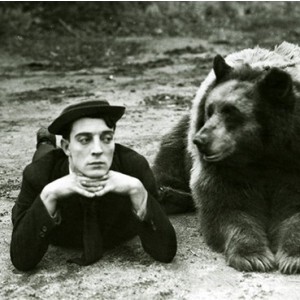EVEN NEIGHBORS HAVE NEIGHBORS.
Act One. The Bear in the Woods.
(Or, Parenting in the Apocalypse, Part Three)

Of course, I knew neighbors existed. I just didn’t have anything to do with them. Why should I? The world is full of people. The fact that some have chosen to temporarily exist nearer to me isn’t all that special. Driving my car I’m surrounded by people who have chosen to take the same road, in the same direction, at the same time. Does that make us close? I don’t think so. I don’t exactly roll down my window and ask if I can borrow sugar. Try shouting ‘you got any sugar?’ at the car next to you in LA traffic. I dare you.
Anti-sociability is a family tradition. For the first decade of my life, the concept of neighbors didn’t exist. Of course, there were Others who occupied the dwellings adjacent to ours, but we moved so often that the whole thing was inverted. Although it was we who moved into their neighborhoods, it happened so frequently that it was really more like they were moving into ours. And what neighborhood was that? Call it Temporary City. We knew it wasn’t going to last, so when Others arrived in Temporary City, we treated them with suspicion.
My parents weren’t the types to go over and introduce themselves with a bottle of wine. They were more the sort to avoid going over while passing a joint. I assumed this was the norm. The reason we didn’t talk to anyone was that they were all sitting at home, stoned, in a haze of Bob Marley and incense, just like us. Temporary City was a really chill place.
The Others were shadowy figures of fascination. The first ones I can remember appeared when I was six years old. One of the really incredible things about following a Swami was that my parents had improbable peers. Cults are great social equalizers, which is one of the under-discussed reasons that they are successful, and were particularly big in the ’80s. Actually, the whole of the ’80s was like a cult meeting led by Gordon Gekko.
By drinking the same Kool-Aid, we counted among our circle nice folks who had actual houses and bank accounts. This is how we ended up in the leafy village of Chipstead, in Surrey, outside of London, in 1979. It was a great big house in which we occupied a room for an entire school year. My parents had the bed and I slept on a mattress on the floor.
The house had a central apple tree in the garden that was continually spurting apples onto the lawn where they would immediately rot. I assumed this was why God had ordered Eve not to eat the apple. It might have rotten bits. It was less of a cosmic no-no than a helpful public service announcement. Of course, this was the same period in which I thought rain was Santa relieving himself on the world. Clearly, my belief system was already crashing.
I could walk to school. The (to me) regally posh lady of the house had a nineteen-year-old post-Mod son with a shaved head and Ben Sherman shirts. He listened to Ska and parked his bedazzled Vespa PX125 outside. I thought it was the most incredible thing I’d ever seen. I couldn’t work out why on earth you’d need so many mirrors, but I liked the way it created a kaleidoscope of images of the road you’re leaving behind. Come to think of it, being a writer is a lot like riding your own Mod scooter through life, minus the skinheads.
My dad had a job as a milkman, which is extinct now, but was once a kind of Amazon delivery of the same thing at the same time every day. It was simpler then. I’d go out in the electric milk float operated by the local dairy at 4.30 every morning. These were once a staple of British life. They were first manufactured in 1901 and for a long time, Britain had more electric vehicles than the rest of the world combined. They were brilliant. In our float, we’d collect crates of aluminum-foil-topped bottles from the dairy to deliver to cozy English houses.
I loved these rides. It felt like we were on a mission together, like a pair of commandos. Delivering the milk acquired the importance of a solemn responsibility. The milk float didn’t have any doors, and although it only went 15 miles per hour, I once fell out of it when my dad took a sharp corner. I landed in the middle of an empty cross-street, but still got up to deliver the milk. After all, without milk for the morning tea, what was left of the British Empire was doomed.
On days when I wasn’t at school, I’d watch the Girl Next Door. She was around eleven and had a blonde ponytail. She lived in a big house with a tennis court. Everything about her existence shimmered in a dewey light. It was like gazing into an incredibly clean Olympus, where groomed, doting parents sipped Pimm’s and cheered a lithe goddess bounding over the court like a gazelle, flinging her racket at balls in super slow motion.
The only place I could get a good look was from the balcony. Up here you could gaze directly into her yard. So I did. Every day. Afternoons were for tennis, and I’d sit on the balcony, following every serve, backhand, and forehand, like an umpire on Center Court. Now, I call this watching, but really it was like stalking. If she knew of the solitary little creep who obsessively spied on her from the balcony every day, she didn’t acknowledge it. On one occasion I actually peed off the balcony rather than go inside and miss a moment. With the benefit of hindsight, I was obviously some kind of pervert, but at the time it just seemed like a logical thing to do.
Living in Chipstead was like being teleported to a Famous Five book. Only there was only one of me. So it was more like The Unknown One. But everything else was the same. The hedgerows with wild berries. The narrow roads and the parish church. Ruddy-faced classmates with names like Giles and Pippa and Roger. One day we abruptly left The Girl Next Door and started renting a room in Edinburgh from a thickly mustached army officer who was seldom at home. When he did return he would do nothing but polish his boots and smoke a cigar and smile at me pitifully, as if to say, stay young, kid. It’s horrible out there. I do my best to pass this look on to other kids to this day.
An ever-changing cast of extras moved in and out of Temporary City. When I was fifteen Temporary City was called Vancouver, Canada. The next-door neighbor was called Mad Mike. He was nineteen and worked in construction. He liked Van Morrison and the Doors. I’d drop by there occasionally to listen to music or hear his stories about working construction. A year later I got a job in construction too, and we’d compare notes. Since he actually knew what the fuck he was doing, the comparisons were pretty short.
Eighteen months later we were preparing to move again, and Mad Mike let me in on his big secret. He had been stealthily building a cabin in the woods on Mt. Seymour. On public land, just across the water from Burnaby. He had done this by patiently stealing construction materials for years and carting them up the mountain on his back, and his camouflaged retreat was now complete. I realized at that moment how he got his first name, but it sounded like utter genius to me. He invited my girlfriend and me to go up there for a night to celebrate. If it seems like the premise of a horror movie, that’s because it is.
My girlfriend Nicky and I drove with Mad Mike to a clandestine spot, parked in the woods, and hiked like sherpas for an hour through dense undergrowth. Mad Mike navigated by tree-tell and path-marks, like a tracker. He had chosen an impressively inaccessible spot. The sort of place you could happily strangle folks in peace, I joked. He laughed. Nicky didn’t. We found the cabin camouflaged in branches. Inside was a well-made safe house. You could picture Jason Bourne growing old here while waiting to be activated. It had an upstairs landing, a bedroom, and a giant stuffed bear.
Mike brought beers, and after a couple of these, he produced the LSD. I had never taken LSD before, but I was reading The Doors of Perception by Aldous Huxley that I had been given by the resident psychic in my mom’s bookstore, so clearly it was preordained. Sure, we were in a murder cabin in the woods with a possibly insane construction worker and there was a giant stuffed bear in the room, but what is the right time, exactly?
When the bear began making faces at me, I wondered if this was the best idea I’d ever had. When the bear began dancing, I felt awkward. Should I dance, too? It would seem impolite not to. So I got up and danced. For possibly two hours, I danced with the Spirit of Stuffed Bear as it explained its totem power to me. I understood with crystal clarity why shamans wore animal skins during ritual initiations. Years later, in the caves at Lascaux, I half expected to see a stick figure of Mad Mike scrawled among the bulls, equines, and stags, holding a beer and a tab.
Bear and I got along well, but when the music slowed it got weird, so I suggested to Mad Mike that we go outside because Nicky had disappeared. We found her hugging a tree that was explaining the whatness of trees to her. We ran naked through the woods and ended up on the structurally unsound roof talking about parallel worlds. Mad Mike said he existed in another dimension as a First Nations medicine man, and with his little hut and his totem animal, I still don’t have a shred of doubt that it’s true. It was a special night. Despite his name, he was one of the sanest people I’ve ever met.
One of Mike’s gifts was to introduce me to the idea of Others as neighbors. Someone who you share an experience with. Even if it’s an illegal cabin and a banned substance. I’m not advocating the use of mind-altering substances, far from it. I’m just saying. If you don’t know your neighbors and have just met them due to quarantine, hallucinogens might be a great ice-breaker. When the world stops ending, show your appreciation by dropping by with a warm “Howdy Neighbor,” and a cup of peyote. It may not be a beautiful day in the neighborhood, but you sure won’t forget it in a hurry!
It’s a strange time when distancing means proximity, and isolation means community. My oldest is nearly at the same age I was when we hiked into Mad Mike’s lair. Her city is not temporary, it’s virtual. She is permanently enmeshed in a digital swarm of others. But the fundamental truth is the same. We don’t simply exist around other people, we carry lessons for them, as they do for us. Hopefully, I went up the mountain that night so she won’t have to. Ever. Seriously, sweetheart. Don’t even think about it…
[image error]


